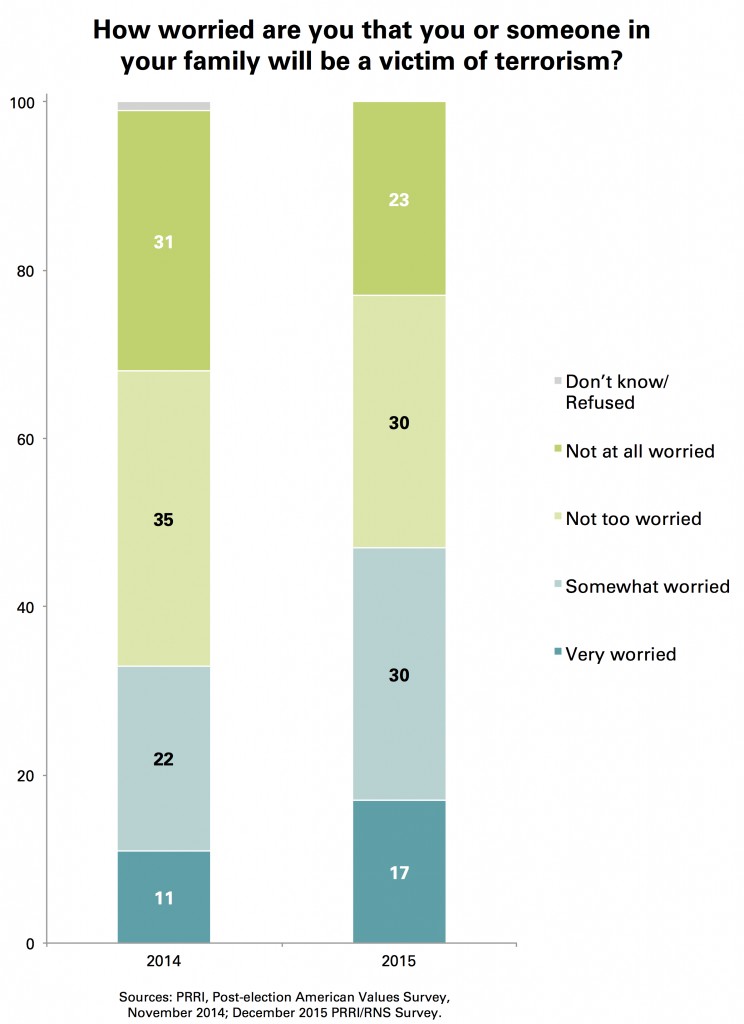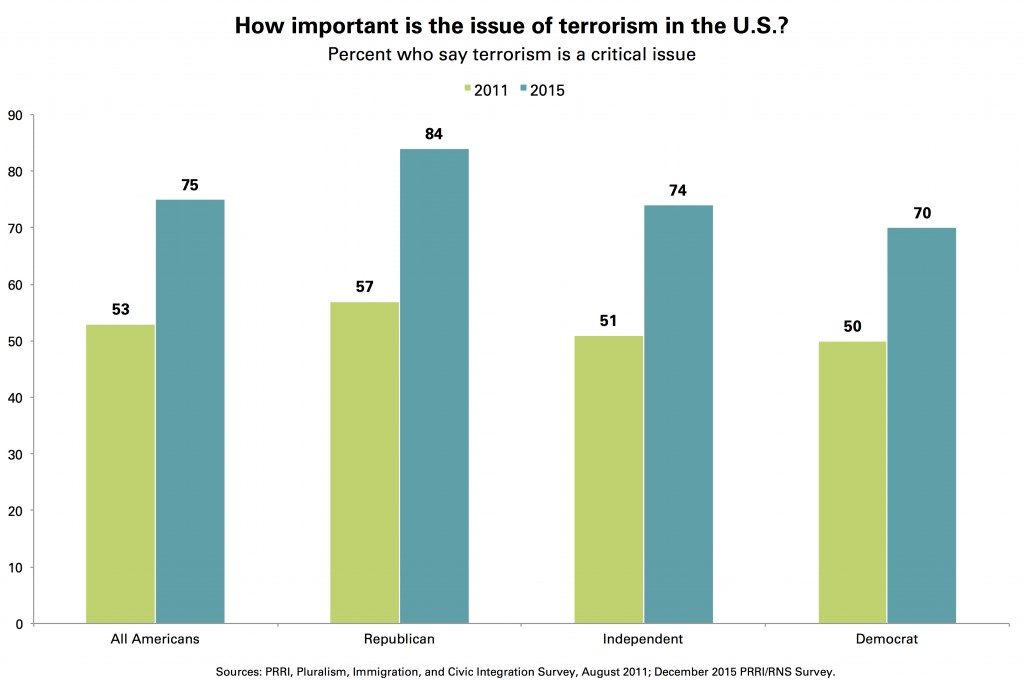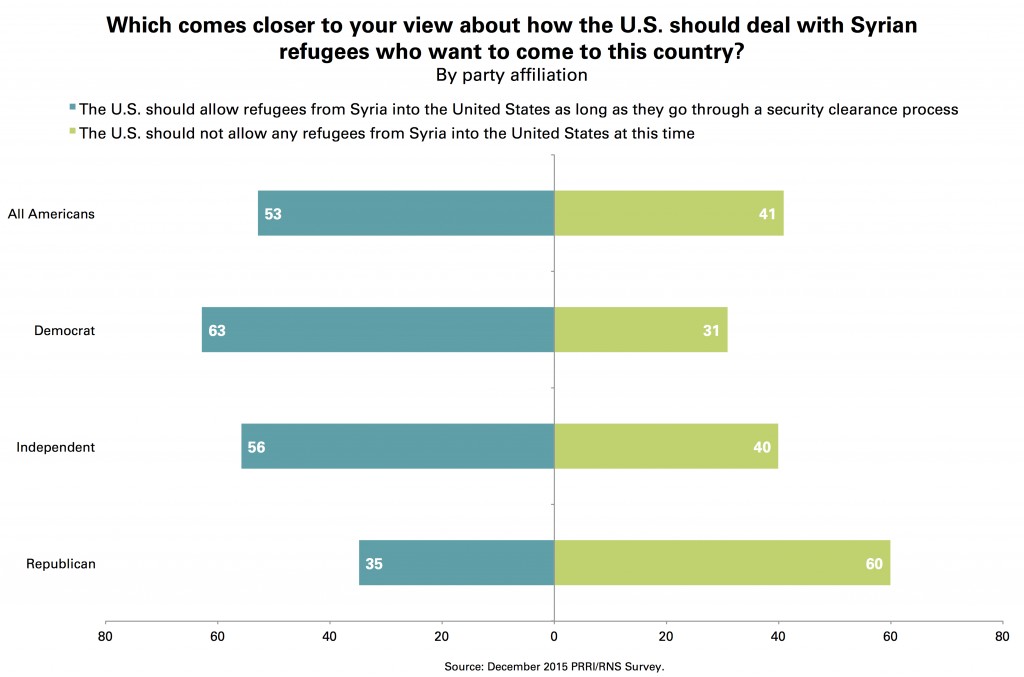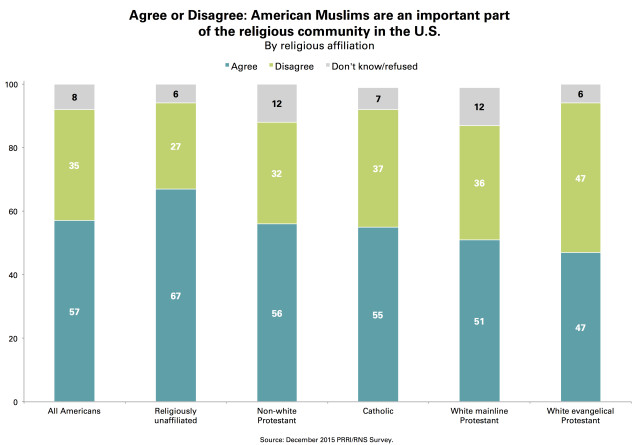Nearly Half of Americans Worried That They or Their Family Will Be a Victim of Terrorism
I. Terrorism Tops Americans’ Concerns
Three-quarters (75%) of Americans say that terrorism is a critical issue in the country, while roughly one in five (21%) say it is one among many important issues and only four percent say it is not that important. Concerns about terrorism have increased substantially over the last few years. In 2011, slightly more than half (53%) of the public said the issue of terrorism was critical.
Americans also report being very concerned about mass shootings. Two-thirds (67%) of Americans say the issue of mass shootings is a critical issue in the U.S. today, while more than one in four (27%) say it is one among many important issues and four percent say that it is not that important an issue.
The public is somewhat less concerned about illegal immigration. Roughly four in ten (41%) Americans identify illegal immigration as a critical issue, while a similar number (37%) say it is one among many important issues. One in five (20%) report that illegal immigration is not that important. Notably, views about the importance of illegal immigration remain largely unchanged since 2011, when roughly four in ten (43%) Americans said illegal immigration was a critical issue.
There are notable partisan cleavages in views about the importance of these issues. Republicans are somewhat more likely than Democrats to say the issue of terrorism is of critical importance (84% vs. 70%, respectively), while Democrats are more likely than Republicans to prioritize the issue of mass shootings (74% vs. 60%, respectively). There is an even deeper partisan divide in views about the importance of illegal immigration: Republicans are more than twice as likely as Democrats to say illegal immigration is a critical issue for the country (63% vs. 30%, respectively). The views of independents roughly mirror those of the general public.
II. More Americans Worried about Being a Victim of Terrorism
 Nearly half (47%) of Americans say they are very or somewhat worried that they or someone in their family will be a victim of terrorism, while 53% say they are not too or not at all worried about being a victim of terrorism. The current level of concern represents a 14 percentage point increase from a year prior, when only one-third (33%) of the public reported being worried about being the victim of a terrorist attack.
Nearly half (47%) of Americans say they are very or somewhat worried that they or someone in their family will be a victim of terrorism, while 53% say they are not too or not at all worried about being a victim of terrorism. The current level of concern represents a 14 percentage point increase from a year prior, when only one-third (33%) of the public reported being worried about being the victim of a terrorist attack.
Notably, Democrats (44%) and Republicans (45%) are about equally as likely to express fear about being personally harmed by terrorism. However, self-identified conservatives (51%) are much more likely than their liberal counterparts (38%) to be worried that they or someone in their family will be a victim of a terrorist attack.
III. The Syrian Refugee Crisis: Most Americans Support Resettlement
Despite heightened concerns about terrorism—and political rhetoric linking Muslim refugees to the threat of terrorism—a majority (53%) of Americans support allowing Syrian refugees to come to the U.S. provided they go through a security clearance process. However, more than four in ten (41%) oppose admitting Syrian refugees into the country.
There are major partisan divisions in views about admitting Syrian refugees. Democrats are much more likely than Republicans to support allowing Syrian refugees into the U.S. (63% vs. 35%, respectively). A majority (56%) of independents also favor admitting Syrian refugees.
The Syrian refugee crisis also reveals major generational divides. Nearly seven in ten (68%) young adults (age 18-29) favor admitting Syrian refugees into the country, while seniors (age 65 and older) are closely divided (45% favor, 46% oppose).
There are no significant differences in attitudes by race or ethnicity, but white Americans are divided by educational attainment. More than six in ten (61%) white Americans with at least a college degree support allowing Syrian refugees into the country. In contrast, white Americans without a college degree are more divided: fewer than half (48%) say that Syrian refugees should be allowed in the U.S., while nearly as may (45%) oppose.
Among Americans who oppose allowing Syrian refugees into the U.S., the most commonly cited reason is that refugees pose a security risk: a majority (57%) say that refugees would threaten American national security. Fewer Americans who object to Syrian resettlement say that allowing refugees into the U.S. would represent a burden on local communities (16%) or that refugees do not share American values (17%).
IV. Americans Muslims: Part of U.S. Religious Community, But Not Doing Enough About Extremism
A majority (53%) of the public agree that American Muslims have not done enough to oppose extremism in their own communities. Roughly one-third (35%) disagree with this statement, while about one in ten (13%) Americans offer no opinion. In recent years, Americans have become more critical of Muslims living in the U.S. for not doing enough to address extremism. In 2011, fewer than half (46%) said American Muslims have not been active enough opposing extremism in their own communities.
There are strong partisan divisions about how responsible Muslims are for addressing extremism. Two-thirds (67%) of Republicans say that U.S. Muslims have not done enough to confront extremism, a view shared by less than half (45%) of Democrats. Fifty-two percent of independents believe American Muslims have not done enough to address extremism in their communities.
Nearly half (47%) of the public believe the values of Islam are at odds with American values and way of life. More than four in ten (43%) disagree, while one in ten (10%) Americans offer no opinion or refused to answer.
At the same time, close to six in ten (57%) Americans say that American Muslims are an important part of the religious community in the country; more than one-third (35%) disagree. This view has been fairly stable over the past few years. In 2011, about six in ten (62%) Americans said American Muslims are an important part of the religious community in the U.S.
There is considerable variation of opinion among religious groups. No group expresses a more inclusive attitude than the religiously unaffiliated: two-thirds (67%) of religiously unaffiliated Americans say that American Muslims are an important part of the U.S. religious community. A majority of non-white Protestants (56%) and Catholics (55%) also agree that Muslims are important party of America’s religious community. Only about half of white mainline Protestants (51%) and fewer than half (47%) white evangelical Protestants agree.
Despite the strong opinions many Americans express about Muslims and Islam, few report knowing a lot about the religion, and most Americans do not have regular contact with someone who is Muslim. Only 16% of the public report knowing a lot about the religious beliefs and practices of Muslims, while more than eight in ten say they know a little (57%) or nothing at all (26%). Fewer than one in ten (8%) Americans report daily contact with someone who is Muslim. Roughly three in ten (29%) say they at least occasionally interact with someone who is Muslim, while a majority say they seldom (26%) or never (36%) have conversations with Muslims.
V. Americans’ Double Standard on Religious Violence
Americans employ a double standard when judging acts of violence committed by Christians and Muslims. Three-quarters (75%) of Americans say that self-identified Christians who commit acts of violence in the name of Christianity are not really Christian. Only 19 percent of Americans say that these types of perpetrators are actually Christian. In contrast, only half (50%) of the public say that self-proclaimed Muslims who commit acts of violence in the name of Islam are not really Muslim. Thirty-seven percent say these perpetrators really are Muslim, while thirteen percent offer no opinion.
VI. Views About Immigration Stable
Despite rising concerns about terrorism, and heated rhetoric about the danger posed by immigrants, American attitudes toward immigrants and support for comprehensive immigration reform remain stable. Roughly half (48%) of Americans say the growing number of newcomers from other countries strengthen American society, compared to 35% who say they threaten traditional American customs and values. Roughly one in ten (11%) Americans agree with both or neither statements, while seven percent offer no opinion.
Stark partisan differences in views about immigration endure. Republicans are roughly twice as likely as Democrats to say that newcomers from other countries represent a threat to traditional American customs and values (53% vs. 27%, respectively). A majority (56%) of Democrats say that immigrants strengthen American society. The views of independents are nearly identical to the views of Americans overall.
Support for comprehensive immigration reform also continues to be robust. More than six in ten (63%) say that the immigration system should allow immigrants who are now living in the U.S. illegally a way to become citizens provided they meet certain requirements; 15 percent of the public say immigrants should be allowed to become permanent legal residents, but should not be granted citizenship; and roughly one in five (18%) say all immigrants living in the U.S. illegally should be deported. Support for a path to citizenship for immigrants currently living in the country illegally has been incredibly stable since early 2013.
VII. The 2016 Presidential Election
Hillary Clinton continues to lead her most serious competitor—Bernie Sanders—by a comfortable margin (52% vs. 31%, respectively) among Democratic and Democratic-leaning registered voters. Only four percent of voters say they would prefer Martin O’Malley over Clinton and Sanders. More than one in ten (13%) Democratic voters say they have no preferred candidate or refused to offer an opinion.
Among Republican and Republican-leaning registered voters, Donald Trump leads his GOP rivals. Nearly one-quarter (23%) of Republican voters say they would like Trump to be the Republican standard bearer in 2016, while 16% say they would prefer Ben Carson. Roughly one in ten Republican voters express support for Marco Rubio (12%), Ted Cruz (11%), and Jeb Bush (9%). Few Republican voters say they would like to see Rand Paul (4%), Chris Christie (3%), John Kasich (2%), Carly Fiorina (2%), or Mike Huckabee (2%) be the Republican nominee in 2016.
Recommended citation:
Jones, Robert P., and Daniel Cox. “Nearly Half of Americans Worried that They or Their Family Will Be a Victim of Terrorism.” PRRI. 2015. http://www.prri.org/research/survey-nearly-half-of-americans-worried-that-they-or-their-family-will-be-a-victim-of-terrorism/.







